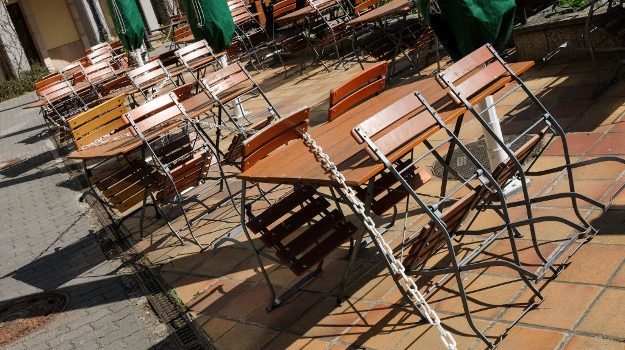


BERLIN: Unoccupied tables and chairs from closed cafes and restaurants can be seen in the Nikolai quarter in Propststraße. (Jens Kalaene/dpa-Zentralbild/ZB (Photo by Jens Kalaene/picture alliance via Getty Images)
- President Cyril Ramaphosa announced eight days ago that restaurants may reopen under lockdown Level 3, but the protocol for their reopening is yet to be gazetted.
- The Restaurant Association of South Africa said regulations have been delayed due to their complexity.
- Here’s what you need to know about restaurants reopening under Level 3.
Eight days since President Cyril Ramaphosa announced that restaurants, hair salons and nail salons would be allowed to reopen for sitdowns under Level 3 of the lockdown, restaurants are still waiting on the government to publish regulations.
In a televised address, Ramaphosa said there was a limit to how long businesses such as restaurants could remain closed during a lockdown, and that government support was not enough to keep them open.
He said, in each instance of an industry reopening, specific and stringent safety requirements would be put in place to slow the spread of the coronavirus and that they would be announced in “due course”.
The regulations for personal care services, such as hair salons, was published three days after Ramaphosa’s announcement, but restaurants are still waiting on their regulations.
Here’s what we know about when restaurants will be allowed to reopen in South Africa:
What has caused the delay?
Restaurant Association of South Africa CEO Wendy Alberts told News24 that they had been informed that the Department of Cooperative Governance had been working around the clock to finalise the new regulations.
However, due to the complexities of the regulations they were taking considerable time deliberate over them, Alberts said.
She said the department had scheduled a meeting on Thursday afternoon to discuss the final protocols, but that this would still require clearance from the health department and the National Coronavirus Command Council (NCCC) before it was gazetted.
Department of Tourism spokesperson Hlengiwe Nhlabathi-Mokota told News24 that the regulations would be released once necessary processes had been completed. Nhlabathi-Mokota said she was unable to indicate when the regulations might be released.
What are the regulations being considered?
Alberts said they were calling on restaurants to be returned to 70% capacity, with liquor sales seven days a week until 21:00.
“People need to at least be able to enjoy a glass of wine with their meals,” she said.
Ocean Basket CEO Grace Harding said their safety protocols included a 1.5-metre distance between tables and temperature checks for every single person entering a restaurant.
Harding said menus would be cut down to reduce contact during ordering and preparation, and would be made available online or through QR code to avoid physical contact with menus.
“People who sit down to eat together should be comfortable to be together without masks,” Harding told News24.
She said they were hoping that the givernment would distinguish between a pub, a coffee shop and a sit-down restaurant – all which would require different regulations.
“Social distancing at a bar counter is very different from social distancing in a sit-down restaurant where guests are not moving around as much,” Harding said.
Spur Corporation CEO Pierre van Tonder said they could not comment on what the regulations may look like until they were released.
Why are restaurants allowed to reopen?
Small Business Development Minister Khumbudzo Ntshavheni told the Sunday Times that restrictions on personal care services and restaurants had to be eased because of the lack of state aid.
Ntshavheni said her department had calculated a need for R13 billion in aid, which could be cut to R9 billion at a pinch, but government coffers could offer only come up with R500 million.
She said, therefore, the government had to allow small businesses to reopen and, as the coronavirus would be a long term reality, people would have to learn to live with it.
Tourism Minister Mmamoloko Kubayi-Ngubane said about 30% of the country’s restaurants had already been forced to close permanently.

